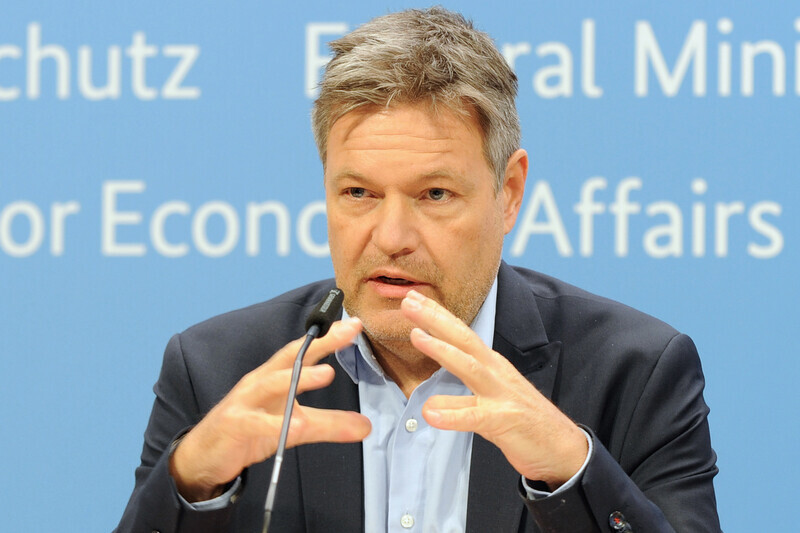hankyoreh
Links to other country sites 다른 나라 사이트 링크
Stronger ties with Korea could help Germany de-risk with China, says vice chancellor

“De-risking doesn’t mean that we want to reduce our economic relations with China, but that we are seeking to find different and additional sources, for example through strengthening our relations with Korea,” said German Vice Chancellor Robert Habeck, who is also federal minister for economic affairs and climate action, in an exclusive interview with the Hankyoreh on Wednesday. The interview was conducted just before Habeck’s two-day trip to Korea on Thursday and Friday.
“Germany and Korea are in a similar situation, both with strong trade ties with China,” noted Habeck while calling for more economic cooperation between his country and Korea.
As co-leader of Germany’s green political party (called Alliance 90/The Greens), Habeck joined the “traffic light coalition” between the Social Democratic Party, the Free Democratic Party and the Greens that made Olaf Scholz chancellor at the end of 2021. Since then, Habeck has been overseeing Germany’s economic and climate-related policies.
On June 5, Habeck agreed to a written interview with the Hankyoreh, a first for the Korean press, ahead of scheduled trips to Korea and China to discuss trade, cutting-edge technology and energy policy.
During his trip to Korea, the German vice chancellor has scheduled meetings with Prime Minister Han Duck-soo and Trade, Industry and Energy Minister Ahn Duk-geun, as well as with representatives of German and EU companies with Korean operations. After wrapping up his itinerary in Korea, he will be continuing to China on Sunday, June 23.
“Germany and Korea are also facing similar geopolitical and geoeconomic challenges. Economic and supply chain cooperation are certainly areas where we want to cooperate more closely,” Habeck remarked.
Habeck is paying back-to-back visits to Korea and China at a time of high trade tensions between the EU and China. The EU recently reached a tentative decision to slap a tariff of up to 48.1% on Chinese-made electric vehicles.
Given Germany’s EU membership, German automakers such as BMW and Volkswagen are opposed to high tariffs on Chinese electric vehicles because of concerns about the potential for retaliatory tariffs from China. The automakers are still seeking a compromise even after the EU’s provisional decision.
When Germany published its first national security strategy in June 2023, it described China as a “systemic rival” and emphasized “de-risking” rather than “decoupling.”
Habeck reiterated Germany’s de-risking strategy in his interview with the Hankyoreh, explaining that de-risking “means avoiding or reducing critical dependencies.”
“Since the start of Russia’s war of aggression against Ukraine, we have seen just how dangerous overdependencies can be. This is why we are now striving towards more diversification in our economic and trade relations,” the German politician said while asserting the need for stronger relations between Germany and Korea.
“Between the economies of Korea and Germany, there are sufficient complementarities,” Habeck observed. “In many sectors, there is already a lot of cooperation happening; for example, German companies are important suppliers for the Korean car and semiconductor industries.”
“Hydrogen may provide new opportunities for sustainable mobility. The Korean semiconductor industry could play a role in increasing supply chain security in this sector, also in Europe,” he added.
Speaking in his capacity as federal minister for economic affairs and climate action, Habeck said, “Germany has made big strides in generating renewable energy. This allows us not only to reduce our carbon footprint, but also our dependence on energy sources from abroad, which is especially relevant in the present geopolitical situation.”
“This was also one lesson from the Russian invasion of Ukraine — energy sources can be used as a weapon. Korea has ample possibilities to make use of offshore wind energy, which in Germany can now be produced without subsidies.”
By Jang Ye-ji, staff reporter; Noh Ji-won, staff reporter
Please direct questions or comments to [english@hani.co.kr]

Editorial・opinion
![[Column] How opposing war became a far-right policy [Column] How opposing war became a far-right policy](https://flexible.img.hani.co.kr/flexible/normal/500/300/imgdb/original/2024/0702/5017199091002075.jpg) [Column] How opposing war became a far-right policy
[Column] How opposing war became a far-right policy![[Editorial] Korea needs to adjust diplomatic course in preparation for a Trump comeback [Editorial] Korea needs to adjust diplomatic course in preparation for a Trump comeback](https://flexible.img.hani.co.kr/flexible/normal/500/300/imgdb/original/2024/0702/9717199086060096.jpg) [Editorial] Korea needs to adjust diplomatic course in preparation for a Trump comeback
[Editorial] Korea needs to adjust diplomatic course in preparation for a Trump comeback- [Editorial] Silence won’t save Yoon
- [Column] The miscalculations that started the Korean War mustn’t be repeated
- [Correspondent’s column] China-Europe relations tested once more by EV war
- [Correspondent’s column] Who really created the new ‘axis of evil’?
- [Editorial] Exploiting foreign domestic workers won’t solve Korea’s birth rate problem
- [Column] Kim and Putin’s new world order
- [Editorial] Workplace hazards can be prevented — why weren’t they this time?
- [Editorial] Seoul failed to use diplomacy with Moscow — now it’s resorting to threats
Most viewed articles
- 110 days of torture: Korean mental patient’s restraints only removed after death
- 2Nine dead in Seoul after car plows into pedestrians
- 3[Editorial] Korea needs to adjust diplomatic course in preparation for a Trump comeback
- 4[Column] How opposing war became a far-right policy
- 5Samsung Electronics workers to go on first strike in company’s 55-year history
- 6Korea to create dedicated population strategy ministry to combat low birth rate, aging society
- 7[Editorial] Silence won’t save Yoon
- 8Japan is building a military meant for more than self-defense — and has the US to thank for it
- 9NewJeans rocks Tokyo Dome as new, younger generation of K-pop fans emerges in Japan
- 10S. Korea joins US, Japan for first multi-domain drills at a time of escalating tensions